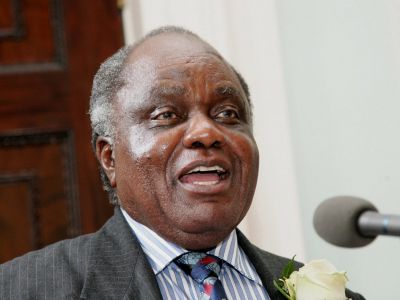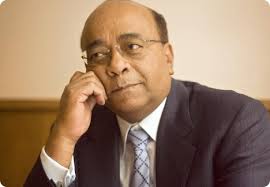Namibia’s president Hifikepunye Pohamba wins the Mo Ibrahim Prize

By Usman Mama
The outgoing president of Namibia, Hifikepunye Pohamba, was named Monday the winner of the Mo Ibrahim Prize aimed at rewarding African leaders for good governance.
During the announcement Monday in Nairobi, Kenya, Salim Ahmed Salim, chairman of the Mo Ibrahim Prize Committee, said: “President Pohamba’s focus in forging national cohesion and reconciliation at a key stage of Namibia’s consolidation of democracy and social and economic development impressed the prize committee.” Salim, former prime minister of Tanzania and a veteran African diplomat who has held numerous key positions at the United Nations, also pointed out Pohamba’s praise-worthy leadership: “During the decade of Hifikepunye Pohamba’s presidency, Namibia’s reputation has been cemented as a well-governed, stable and inclusive democracy with strong media freedom and respect for human rights.”
Pohamba has been praised by the World Bank for overseeing strong economic growth with gross domestic product per capita rising from $3,297 in 2004 to $5,693 in 2013.
The Mo Ibrahim Prize for Achievement in African Leadership, named after its founder, Sudanese-British mobile communications entrepreneur and billionaire, Dr. Mohamed “Mo” Ibrahim, comes with an initial payment of whopping $5 million over a ten-year period, and $200,000 annual payment for life to African heads of state who deliver security, health, education and economic development to their constituents and democratically transfer power to their successors. Ibrahim spoke highly of Pohamba during Monday;s ceremony: “He has served his country since its independence and his leadership has renewed his people’s trust in democracy. His legacy is that of strengthened institutions through the various initiatives introduced during his tenure in office. He is a role model for the continent.”

Pohamba is the first acting president to receive the world’s most valuable prize, but he is expected to step down this month to hand over power to the country’s newly-elected leader, Hage Geingob.
Pohamba was elected in 2004 and reelected in 2009. The 79-year old outgoing president is a political icon in his country. A founding member of Namibia’s ruling party, South West Africa People’s Organisation (SWAPO), he was held as a political prisoner during South Africa’s colonial rule over the country, and whipped in public for advocating for independence. His legacy includes his commitment to reconciliation with political adversaries, his push for gender equality, and the promotion of housing and education
Pohamba is the first leader to receive the Mo Ibrahim award since 2011 when the honor was bestowed on former president Pedro Verona Pires of Cape Verde, and only the fourth recipient since the establishment of the prize in 2007. The others include Botswana’s former president, Festus Gontebanye Mogae, who won in 2008, and Mozambique’s former president Joaquim Alberto Chissano, who was awarded the prize in 2007. Nelson Mandela was given an honorary prize in 2007.
So, for three years in a row, the Mo Ibrahim Foundation could not find a suitable winner, for reasons that may not surprise observers of the African political scene.
While elections do take place in Africa, even on schedule, leaders such as Pedro Verona Pires and Hifikepunye Pohamba, who bow out gracefully in accordance with the constitution, are in the minority on the African continent where the majority of the leaders are reluctant to step down at the end of their constitutional mandate, or don’t try hard enough–if at all–to deliver on their campaign promises of better health, education and economic development to their people. Attempts to change the constitution to stay in power indefinitely are commonplace in Africa despite the violent uprising that the move triggers in country after country. Case in point: the violent ousting, last October, of President Blaise Compaore of the West African nation of Burkina Faso. Compaore was known to wear the mantle of “peace coordinator” in other counties shaken by similar violence… before his turn came to face the music when he stubbornly tried to change the constitution to stay in power.


